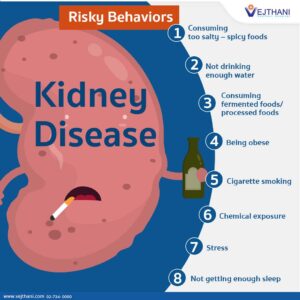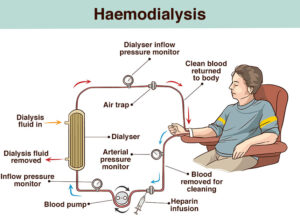When you have severe back pain and problem in urination?
The cause of the back pain with relate to urination may point out that the most probably problem may occur in kidney, or In passage of urine so know we discuss about the renal failure before we know the cause of back pain in problem in urination.
- kidney failure:
The kidneys are two bean-shaped organs, each about the size of a fist. They are located just below the rib cage, one on each side of your spine. Healthy kidneys filter about a half cup of blood every minute, removing wastes and extra water to make urine Kidney is an organ for the purification and removal of waste material. It helps in purification of blood . To study renal failure we should know the normal structure and functions of kidney:

Structure of the kidney
The kidneys are bean shaped organ located in the back of our abdomen. They kidney has an inner light color region named as medulla and a dark outer area named as cortex. They have functional basic unit called nephron which help in filtration of blood our body have approximately 1.8 to 2 million nephron in each kidney. The basic structure of nephron consist of a sieve like structure called glomerulus surrounded by a capsule like structure named as Bowman capsule which continues in backwards in proximal convoluted tubule then in loop of Henle which continues in distal convoluted tubule which open in to collecting duct by which waste material is excreted out.
Functions Of Kidney
Here are some function of kidney
- The kidneys helps in maintaining electrolyte balance and water volume by absorbing extra amount of water and excretion of excessive amount of electrolytes.
( sodium, potassium and calcium).
- Kidney releases variety of hormones ( chemical that enhanced our body functions) , for example, erythropoietin is a hormone which is release when blood cell count decrease.
- From blood kidney eliminate toxic molecules, by excreting them into urine for example, drugs, waste materials etc.
- Excretion is the removal of the metabolic waste products from the body. These include carbon dioxide and nitrogenous basis. In humans , nitrogenous bases are in form of urine. Ammonia is converted to urea In the ornithine cycle.( Liver) and urea is excreted in the form of urine.

Now have a look on kidney failure.
Definition:
- Inability of kidneys to perform excretory function leading to accumulation of waste products.
Types of Renal Failure:
- There are two types of renal failure:
- Acute renal failure (ARF)
- Its a disease in which the kidney suddenly fail to carry out its proper function of filtration for example: In trauma or accident, excessive blood loss may lead to acute renal failure.
2 Chronic renal failure (CRF)
- It is the long term continues abnormality of kidney function. Like if you are suffering from a high blood pressure for a long period of time it may create pressure on kidney and may lead to chronic renal failure.
Chronic Kidney Disease is classified on the basis of that how much blood fluid is purified at specific time or also called filtration rate :
- Grade 1 : Filtration rate greater than 90.
- Grade 2 : 60 to 89.
- Grade 3a : 45 to 59.
- Grade 3b : 30 to 44.
- Grade 4 : 15 to 29.
- Grade 5 : less than 15.
Causes of Renal Failure:
There are different causes for acute and chronic renal failure. They are
Acute renal failure:
- Prerenal : ( problem cause at any part of the organ or in any region before the kidney which may affect the kidneys function) like low blood pressure, volume contraction ( blood volume depletion ) , severe organ failure such as heart failure.
- Intrarenal ( problem occur in any part of the kidney) for example Any vessels damage , less of oxygen to the kidney or any toxin which affect the filtration of kidney.
- Postrenal problem occur in passage of urine after kidney (kidney- ureter- bladder- urethra ) For example outside organ pressure (prostatic hypertrophy ( male gland enlargement), carcinoma) , internal wall blockage.
Chronic renal failure:
- Diabetes mellitus especially type 2 ( high blood sugar level) It damage the nephron which is basic unit of kidney and perform the function of filtration of blood. Diabetes damages to nephron may cause improper filtration and lead to chronic Kidney failure.
- Hypertension ( high blood pressure) cause the vessel narrow which affect the filtration. Improper filtration lead to the renal failure.
- Glomerulonephritis ( infection in glomerulus) As discuss occur earlier glomerulus is sieve like structure which help in filtration. So infection or damage to glomerulus cause improper filtration of blood.
- Recurrent kidney infections due to continuous high blood pressure and other force they kidney vessels get damage and blood flow outside the vessel cause internal bleeding it lead to chronic Kidney failure.
What are Signs and symptoms of renal failure:
Kidney failure show following sign and symptoms
- Swelling in legs , ankle or feet.
- Fatigue ( tiredness).
- Irregular heartbeat.
- High blood pressure.
- Headaches.
- Short of appetite.
- Edema.
- Decreased urine output, although occasionally urine output remains normal.
- Fluid retention, causing swelling in your legs, ankles or feet.
- Shortness of breath.
- Chest pain or pressure.
- Seizures or coma in severe cases.

When to see a doctor?
If you are suffering from severe pain in the back, and you are facing problem in peeing, make a visit to the doctor, and if you have swelling in the hands and feet than it is an alarming condition. Make a visit to doctor as soon as possible.
Risk factors:
The risk factors of the kidney failure are
- Being hospitalized, especially for a serious condition that requires intensive care.
- Advanced age.
- Diabetes ( high blood sugar level) because high blood sugar level unable kidney to filter out blood properly as it damage the nephron.
- Hypertension ( high blood pressure) because high blood pressure cause abnormal blood flow to the kidney which damage kidney due to less blood supply the tissue of kidney may has less nutrition and may under go kidney damage.
- Heart disease like heart failure, heart valve abnormality that effect the blood flow.
- Obesity because high weight unable kidney to filter blood property because due to obesity level of cholesterol increase in blood and deposit in blood vessel so it cause narrowing of vessels so pressure will increase and filtration will decrease lead to kidney damage.
- Family history of kidney disease may be it transfer from parents to offspring.
- Past damage to the kidneys such as trauma or accident or injury to kidney.

Complications of renal failure:
Renal failure cause several complications include
- Fluid retention due to kidney failure water volume overload but not excrete due to which fluid accumulate and cause kidney size enlargement and other organ blood vessels blockage.
Hyperkalemia ( high level of potassium in blood due to failure of kidney, improper filtration cause potassium to increase in blood and hyperkalemia) due to which our muscle take less time of relaxation and continuous state of contraction cause muscle damage .
- Anemia ( low blood cell count ) as blood can’t get filter properly and there toxin material remain and cause destruction of blood cells.
4.Hyponatremia ( low level of sodium in blood due to kidney failure) Sodium cause contractions of muscle due to kidney failure improper filtration cause the less sodium level due to which muscle contraction is abnormal and muscle remain in a state of relaxation..
- Chest pain. If the lining that covers your heart (pericardium) becomes inflamed, you may experience chest pain.
- Muscle weakness. When your body’s fluids and electrolytes — your body’s blood chemistry — are out of balance, muscle weakness can result.
Permanent kidney damage:
Death is caused by acute kidney failure which can lead to loss of kidney function and, ultimately, death.
What is the Treatment for Renal Failure:
- There are two treatments for kidney failure:
- Dialysis: procedure to remove waste products and excess fluid from blood when kidneys stop working properly.
- Kidney transplant: kidney replacement by healthy person kidney.

.
How to Prevent renal failure:
Renal Failure is prevented by following way
- Healthy balanced diet can reduce your risk of kidney disease. As it contain normal quantity of minerals and nutrients.
- Keep your blood pressure below 140/90mmHg. Because high blood pressure cause abnormal blood flow.
- Eat more fruits and vegetables. Vegetables like beans are very healthful for kidney.
- Stay in your target cholesterol range. Because high cholesterol or lipid cause blockage of blood vessels due to which blood flow is effect.
- Eat foods lower in salt concentration. As it increases the sodium level as it cause abnormal muscle contraction.
- Avoid smoking and alcohol because they are toxin cause high risk of renal and liver failure.
- Do not over use drugs as it cause severe renal failure.
- Exercise daily to keep your body healthy and blood flow normal.
GENERAL SUPPORTIVE CARE:
Lifestyle and home remedies:
During your recovery from acute kidney failure, your doctor may recommend a special diet to help support your kidneys and limit the work they must do. Your doctor may refer you to a dietitian who can analyze your current diet and suggest ways to make your diet easier on your kidneys.
Depending on your situation, your dietitian may recommend that you:
Choose lower potassium foods. Your dietitian may recommend that you choose lower potassium foods. High-potassium foods include bananas, oranges, potatoes, spinach and tomatoes. Examples of low-potassium foods include apples, cauliflower, peppers, grapes and strawberries.
Avoid products with added salt. Lower the amount of sodium you eat each day by avoiding products with added salt, including many convenience foods, such as frozen dinners, canned soups and fast foods. Other foods with added salt include salty snack foods, canned vegetables, and processed meats and cheeses.
Limit phosphorus. Phosphorus is a mineral found in foods, such as whole-grain bread, oatmeal, bran cereals, dark-colored colas, nuts and peanut butter. Too much phosphorus in your blood can weaken your bones and cause skin itchiness. Your dietitian can give you specific recommendations on phosphorus and how to limit it in your particular situation.
As your kidneys recover, you may no longer need to eat a special diet, although healthy eating remains important.
Author


